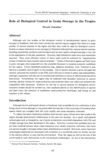Role of Biological Control in Grain Storage in the Tropics
JIRCAS international symposium series
| ISSN | 13406108 |
|---|---|
| 書誌レコードID(総合目録DB) | AA1100908X |

本文フルテキスト
intlsymp-7_73-86.pdf491.81 KB
Although only few studies on the biological control of stored-product insects in grain storages in Southeast Asia have been carried out, several reports suggest that there is a large number of natural enemies in the region and that they could be used for biological control. Studies on insect infestation in rice storages in Thailand indicated that various natural enemies, including parasitoids, predators and intruders such as ants, spiders and geckoes play a key role in the suppression of the pest population. However, high infestation cases were also sometimes reported. Thus, more efficient control of insect pests could be achieved by "augmentative release of selected mass-cultured natural enemies". Tables of biocontrol agents and their hosts in grain storages were prepared from the available literature to examine potential candidates for the region. Newly identified predacious bug, Joppeicus paradoxus, from Thailand is also listed as a possible control agent in the storages. Use of natural enemies in grain storages has recently attracted the attention in the USA and in Europe in terms of safety and sustainability, although comparison with the use of conventional chemicals in terms of effectiveness should be determined. Nevertheless, the region may be endowed with abundant resources in natural enemies, optimal climate for mass-production and moderate labor cost which can minimize the competition with chemicals. However for the use of natural enemies for biological control, extensive studies should be carried out, with emphasis placed on the identification of species and their hosts, the selection of candidates, mass-production techniques, and timing of, and numbers in the release.
| 作成者 | Hiroshi Nakakita |
|---|---|
| 公開者 | Japan International Research Center for Agricultural Sciences |
| オンライン掲載日 | |
| 号 | 7 |
| 開始ページ | 73 |
| 終了ページ | 86 |
| 言語 | eng |
